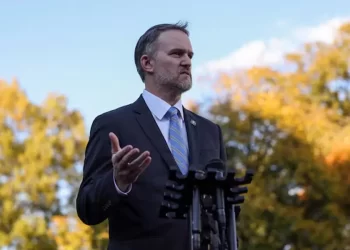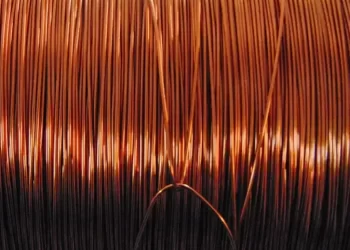Boeing CEO David Calhoun defended the company’s safety record during a contentious Senate hearing Tuesday, while lawmakers accused him of placing profits over safety, failing to protect whistleblowers, and even getting paid too much.
Relatives of people who died in two crashes of Boeing 737 Max jetliners were in the room, some holding photos of their loved ones, to remind the CEO of the stakes. Calhoun began his remarks by standing, turning to face the families, and apologizing “for the grief that we have caused,” and vowing to focus on safety.
Calhoun’s appearance was the first before Congress by any high-ranking Boeing official since a panel blew out of a 737 Max during an Alaska Airlines flight in January. No one was seriously injured in the incident, but it raised fresh concerns about the company’s best-selling commercial aircraft.
The tone of the hearing before the Senate investigations subcommittee was set hours earlier, when the panel released a 204-page report with new allegations from a whistleblower who said he worries that defective parts could be going into 737s. The whistleblower is the latest in a string of current and former Boeing employees to raise concerns about the company’s manufacturing processes, which federal officials are investigating.
“This hearing is a moment of reckoning,” the subcommittee chairman, Richard Blumenthal, D-Conn., said. “It’s about a company, a once iconic company, that somehow lost its way.”
Sen. Josh Hawley, R-Mo., placed the blame squarely on Calhoun, saying that the man who became CEO in January 2020 had been too focused on the bottom line.
“You are cutting corners, you are eliminating safety procedures, you are sticking it to your employees, you are cutting back jobs because you are trying to squeeze very piece of profit you can out of this company,” Hawley said, his voice rising. “You are strip-mining Boeing.”
Hawley repeatedly mentioned Calhoun’s compensation for last year, valued at $32.8 million, and asked the CEO why he hasn’t resigned.
“Senator, I’m sticking this through. I’m proud of having taken this job. I’m proud of our safety record, and I’m proud of our Boeing people,” replied Calhoun, who has announced that he will step down by year end.
Hawley interrupted. “You’re proud of the safety record?” he asked with incredulity.
“I am proud of every action we have taken,” Calhoun responded.
Senators pressed Calhoun about accusations that Boeing managers retaliated against employees who reported safety concerns. They asked the CEO if he ever spoke with any whistleblowers. He replied that he had not, but agreed it would be a good idea.
The latest whistleblower, Sam Mohawk, a quality assurance investigator at Boeing’s 737 assembly plant near Seattle, told the subcommittee that “nonconforming” parts — ones that could be defective or aren’t properly documented — could be winding up in 737 Max jets.
Potentially more troubling for the company, Mohawk charged that Boeing hid evidence after the Federal Aviation Administration told the company it planned to inspect the plant in June 2023.
“Once Boeing received such a notice, it ordered the majority of the (nonconforming) parts that were being stored outside to be moved to another location,” Mohawk said, according to the report. “Approximately 80% of the parts were moved to avoid the watchful eyes of the FAA inspectors.”
The parts were later moved back or lost, Mohawk said. They included rudders, wing flaps and other parts that are crucial in controlling a plane.
A Boeing spokesperson said the company got the subcommittee report late Monday night and was reviewing the claims.
The FAA said it would “thoroughly investigate” the allegations. A spokesperson said the agency has received more reports of safety concerns from Boeing employees since the Jan. 5 blowout on the Alaska Airlines Max.
The 737 Max has a troubled history. After Max jets crashed in 2018 in Indonesia and 2019 in Ethiopia, killing 346 people, the FAA and other regulators grounded the aircraft worldwide for more than a year and a half. The Justice Department is considering whether to prosecute Boeing for violating terms of a settlement it reached with the company in 2021 over allegations that it misled regulators who approved the plane.
Mohawk told the Senate subcommittee that the number of unacceptable parts has exploded since production of the Max resumed following the crashes. He said the increase led supervisors to tell him and other workers to “cancel” records that indicated the parts were not suitable to be installed on planes.









